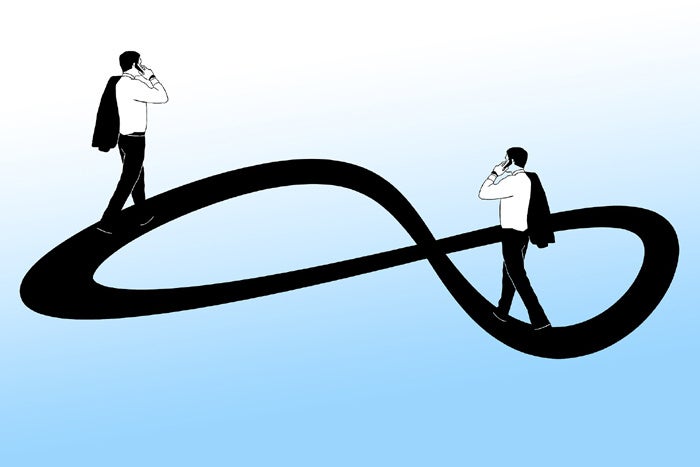Stop me if you've heard this one: Google has a new plan for fixing its mess of messaging apps and bringing clarity, consistency, and order to an area that's been chaotic for far too long.
As reported in a novel-length story by The Verge last night, Google is "pausing" all work and investments in Allo — the standalone chat service announced with great fanfare in 2016 — and moving the entire Allo team over to Android Messages, the company's current default SMS app for Android devices.
Android Messages, though, won't just be about basic SMS anymore; it'll soon include an expanded form of RCS, or Rich Communication Services — a newer standard that's kind of like a next-gen version of SMS (and that requires carrier support in order to work).
We've been hearing about Google's plans to embrace RCS for quite a while now. The problem is that because of the nature of the protocol, it's up to carriers to get on board with it — so progress has been slow-going. But now, Google is supposedly ready to roll out a broader system of RCS support in Android Messages, which will be known as (drumroll, please...) "Chat."
It'll be up to each carrier as to if and when the switch gets flipped and the richer "Chat"-oriented messaging capabilities come online for its network. Google thinks a lot of carriers will be ready sometime in the next year. Or maybe two. It'll probably vary a bit from one region to the next. Oh, and the next-gen messaging stuff will work only when everyone involved in the conversation has said support enabled. Otherwise, the system will fall back to regular ol' SMS.
You know what? Forget all that mumbo-jumbo. I can sum this whole thing up for you in three simple points:
- Allo is essentially being abandoned, as expected
- Google is doubling down on Android Messages and RCS, as expected
- Everyone's going to continue being confused, as expected
But wait...
Here's the really crazy thing about this whole switcheroo: Remember when Google Talk (a.k.a. "Gchat") was the interoperable cross-platform messaging standard with a massive built-in userbase? It was preinstalled on every Android device, present in the sidebar of every Gmail inbox, and running on countless computers via its official desktop app or its integration with numerous other popular messaging programs.
Then one day, Google combined Talk with a service that seamlessly integrated its messaging functionality with regular SMS. It was called Hangouts, and it was touted as "Google's big fix for its messaging mess." You could exchange rich messages with other Hangouts users and send SMS messages to anyone else, all within one convenient app that worked pretty much everywhere. Heck, there was even an exclusive write-up revealing the details of the strategy at The Verge!
So, to recap: Google had an interoperable cross-platform message standard. It had a huge amount of users on board. It had a way to combine that messaging standard with SMS to create a single unified messaging app that'd do it all on Android and beyond.
Is it just me, or is that almost exactly what Google is trying to achieve right now? It's almost like, I don't know: Maybe the company should have focused on making Hangouts a really good unified product instead of changing directions a thousand times and turning its messaging strategy into a modern-day Abbott and Costello routine.
To put it all together now...
So, let's see: At this point, we've got the carrier-dependent Android Messages/"Chat" combo in the works — well, at least for some phones. I forgot to mention: Not all Android devices will ship with Android Messages. But some of the manufacturers that use their own proprietary alternatives, like Samsung, will still support "Chat" in some form within their own messaging apps. That certainly won't confuse anyone.
We've got Hangouts, which is hanging on by a thread and still kinda-sorta exists for consumers. For anyone keeping track, we're now into month 13 of its ongoing transition into being a two-pronged enterprise product called Hangouts Chat and Hangouts Meet. (Those apps also now exist alongside the regular old Hangouts app, which absolutely isn't befuddling.)
We've got Allo, which is a standalone chat service that continues to exist for the moment, despite by all signs now being on life support — and also Duo, a standalone video chat service launched alongside Allo that seems to be chugging along.
There's Google Voice, which seemed to be on life support itself until a sudden renewed commitment to it came up out of nowhere last year.
Then there's whatever the hell the chat service in the sidebar of Gmail is called these days. I'm pretty sure it's still technically Hangouts at this point, but most people know it as "Gchat" or "Google Chat" (and I don't think anyone — outside of Google or within — fully understands what the long-term plan is for that space).
And don't even get me started on Project Fi and how that fits in with all of this.
But hey, fixing a mess of this caliber has to start somewhere — right? Maybe this will be the step that actually leads to simplification and a sensible messaging strategy for a company that by all counts should be winning the mobile messaging race. Maybe. But after more overlapping messaging apps and more convoluted strategies than any sane person can possibly remember at this point, it's getting hard to have faith that any new effort will be the one that sticks (especially when said effort has so many asterisks and unknowns attached).
Now, who wants to place a bet on when the next big pivot will begin?
Sign up for JR's new weekly newsletter to get this column along with bonus tips, personal recommendations, and other exclusive extras delivered to your inbox.

[Android Intelligence videos at Computerworld]






